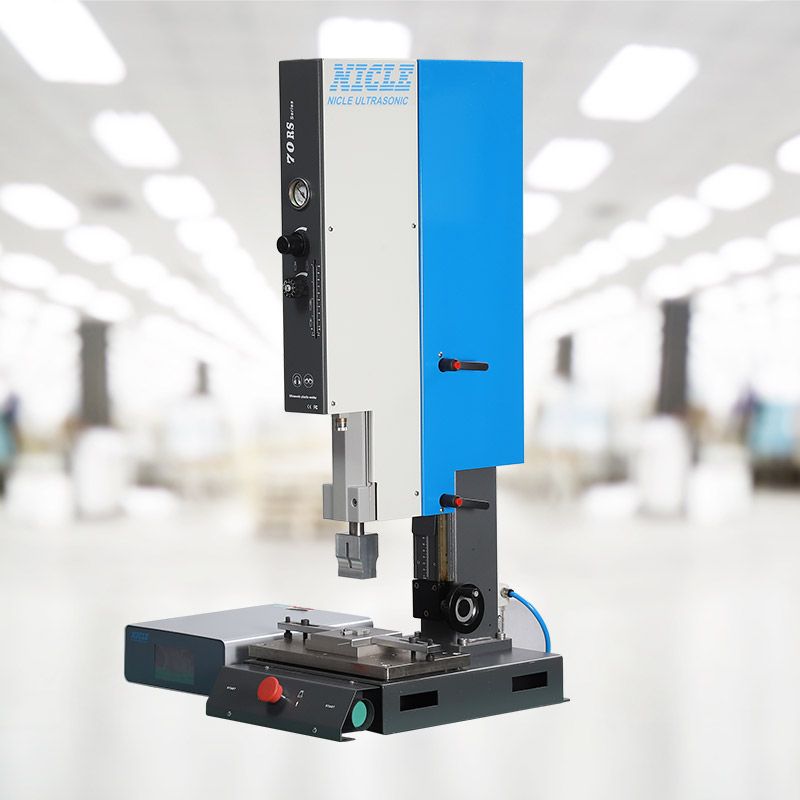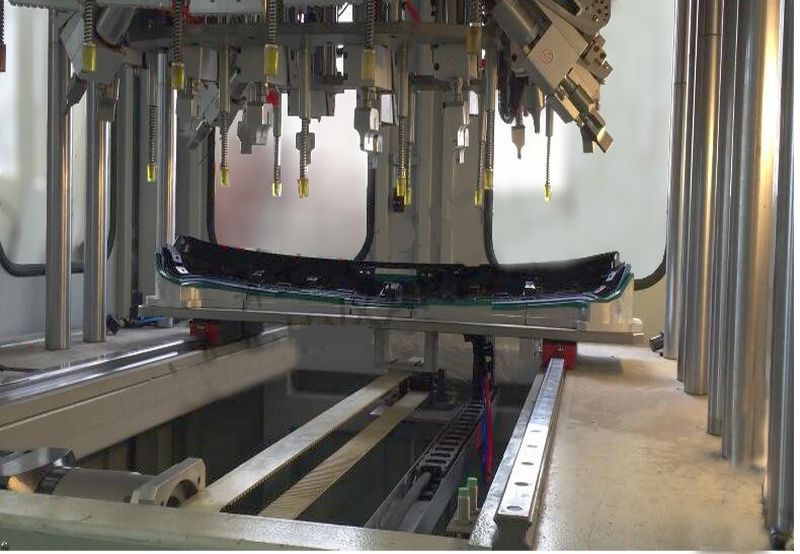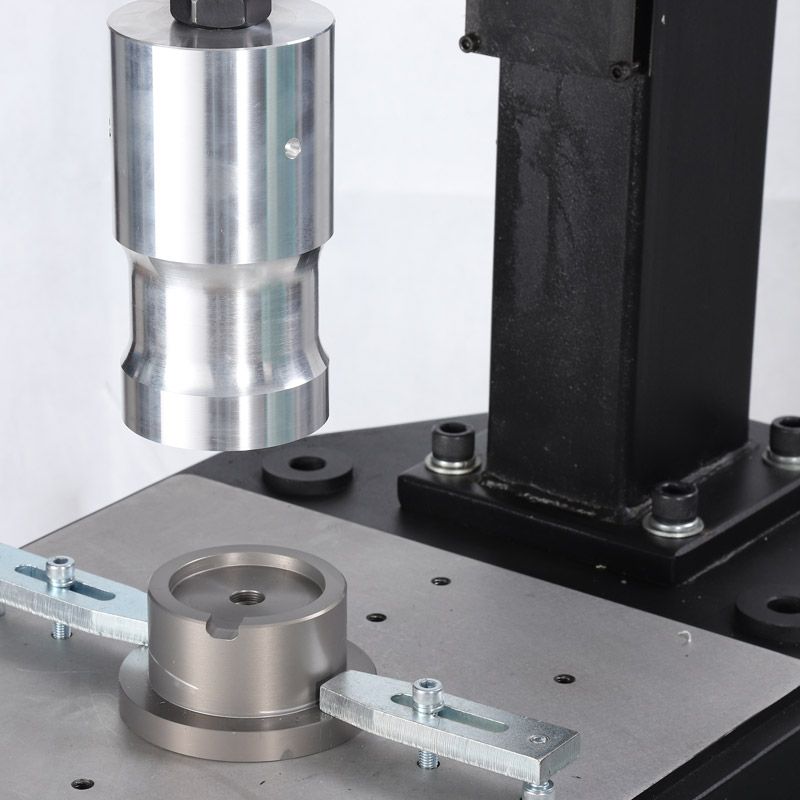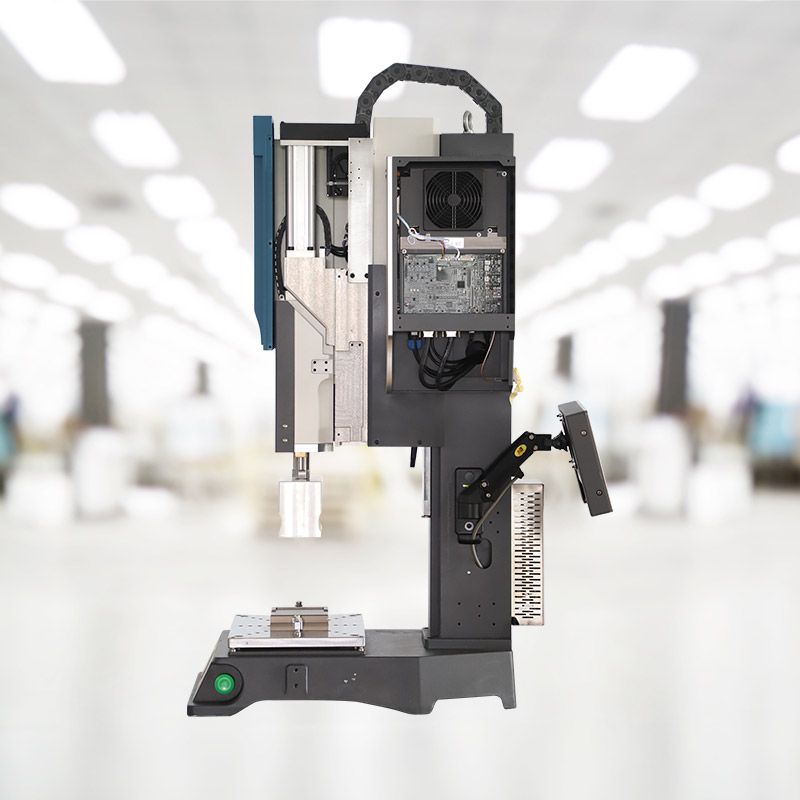Best Ultrasonic Welding Machine: Compare Brands & Features

When it comes to manufacturing, precision and efficiency are key. Ultrasonic welding machines are a revolutionary solution for joining materials like plastics, metals, and composites with minimal heat and pressure.
Whether you're looking to streamline your production line, improve weld quality, or reduce costs, choosing the best ultrasonic welding machine can significantly impact your bottom line.
In this guide, we'll walk you through the essential features to consider, compare leading ultrasonic welding brands, analyze costs versus returns, explore applications across industries, and give you practical tips on maintenance.

Table of Contents
Key Features to Consider When Choosing an Ultrasonic Welding Machine
Comparative Analysis of Leading Ultrasonic Welding Brands
Cost Analysis: Investment vs. Return on Ultrasonic Welding Machines
Understanding Ultrasonic Welding Technology
Applications of Ultrasonic Welding Across Industries
Maintenance and Operational Considerations for Ultrasonic Welders
FAQs
Conclusion
Key Features to Consider When Choosing an Ultrasonic Welding Machine
Selecting an ultrasonic welding machine isn't just about picking the most expensive model. It's about understanding the features that will bring value to your specific needs.
Here's what you should keep in mind:
Frequency
The frequency of an ultrasonic welding machine determines the intensity of the sound waves it generates, affecting its welding ability. Common frequencies range from 20 kHz to 70 kHz.
Lower frequencies (around 20 kHz) are ideal for welding thicker materials, while higher frequencies (40-70 kHz) work better for finer, more delicate applications.
Welding Modes
Ultrasonic welding machines can come with several welding modes, such as continuous, pulse, and burst welding. These modes control how the machine applies sound waves to the materials.
Depending on your project, you'll need a welder that offers the correct mode for your specific welding needs.

Power Output
The power output of an ultrasonic welding machine directly affects the speed and efficiency of the weld. Machines with higher power output tend to work faster and are more effective in high-volume environments.
It's essential to balance power and precision, ensuring the machine doesn't overheat or cause damage to sensitive materials.
Control Systems
A good ultrasonic welding machine should come equipped with an intuitive control system. Digital controls, adjustable parameters, and programmable settings allow for more precise control over the welding process.
Ultrasonic welding machines with modern control systems often come with touchscreen interfaces for easy operation.
Monitoring Features
Advanced monitoring features such as real-time data tracking, vibration monitoring, and quality control sensors can help ensure the quality of every weld.
These features not only enhance the reliability of the process but also provide real-time insights that can help improve efficiency and minimize errors.
Tooling Compatibility
Tooling is an important consideration when choosing an ultrasonic welding machine. The best machines offer compatibility with a wide range of tools, allowing them to handle different materials and shapes. Always verify whether the machine can accommodate the tooling you require for your specific application.
Reliability and Durability
Ultrasonic welders are investment pieces, so reliability and durability are non-negotiable. A good welding machine should operate seamlessly under continuous use, with minimal downtime.
Look for machines that are built to last, with robust construction and high-quality materials.
Cost
While it's tempting to choose the cheapest option, it's essential to think long-term. A low-cost machine may save you money upfront but could result in higher maintenance costs or lower efficiency.
Look for a balance of quality, performance, and price, keeping in mind the machine's operational costs and how quickly it can pay for itself through improved production rates and weld quality.
Comparative Analysis of Leading Ultrasonic Welding Brands
When selecting the best ultrasonic welding machine, choosing a reliable and reputable brand can make all the difference in terms of performance, durability, and customer support.
Below, we'll compare some of the leading brands in the ultrasonic welding market, such as Dizo Global, to help you understand their offerings, features, and strengths.
1. Dizo Global
Overview
Dizo Global is a well-known player in the ultrasonic welding machine market, offering a range of machines that combine efficiency, reliability, and cost-effectiveness.
Dizo ultrasonic welding machines are favored by manufacturers looking for flexible and affordable solutions, especially in industries such as automotive, electronics, and packaging.

Key Features:
- Affordable yet High Quality: Dizo Global strikes a balance between cost and performance, making it a great option for both small businesses and large enterprises.
- Customizable Tooling: Dizo's machines are compatible with a wide range of tooling options, making them suitable for various manufacturing needs.
- User-Friendly Control Systems: Their machines come with easy-to-use control systems, which makes setup and operation simple even for those new to ultrasonic welding.
- Durability: Known for producing machines that can handle continuous use with minimal maintenance requirements.
Best For:
- Small to Medium Enterprises: Ideal for businesses looking for a reliable, entry-level ultrasonic welding machine without the high upfront costs of some premium brands.
- Cost-Conscious Production: Suitable for manufacturers focused on balancing price with quality and efficiency.
2. Branson (Emerson)
Overview
Branson, a part of Emerson Electric, is one of the most reputable names in the ultrasonic welding market. With decades of experience, Branson offers high-precision, durable ultrasonic welding systems used by many industries, including automotive, medical, and electronics.
Key Features:
- High Precision: Branson ultrasonic welders are known for their ability to produce fine, consistent welds, particularly in applications requiring tight tolerances, like medical device manufacturing.
- Advanced Control Systems: Branson machines come with sophisticated programmable controls that allow for easy customization of welding parameters.
- Reliability: Their machines are engineered for longevity and can handle large-volume production runs with minimal maintenance.
- Versatility: Suitable for a wide range of materials, including plastics, metals, and composites.
Best For:
- High-Volume Manufacturing: Ideal for large-scale production in industries like automotive, electronics, and medical devices.
- Precision-Driven Applications: A top choice for manufacturers needing highly accurate and repeatable welding results.
3. Sonics & Materials, Inc.
Overview
Sonics & Materials, Inc. is another well-established brand in the ultrasonic welding machine industry. Known for its innovation and high-performance machines, Sonics & Materials focuses on offering ultrasonic welders for industries like medical, automotive, and consumer electronics.
Key Features:
- High-Performance Machines: Sonics & Materials offers machines designed for high-intensity use, delivering fast and powerful welds.
- Advanced Monitoring Capabilities: Many of their models come equipped with built-in sensors and diagnostic tools for real-time process monitoring and control.
- Extensive Product Range: From small, tabletop units for light-duty welding to larger machines for industrial-scale production, Sonics & Materials provides solutions for a wide range of applications.
- Customization: They offer customizable tooling options to meet specific customer needs.
Best For:
- Complex Applications: Ideal for industries where performance and precision are critical, such as the medical and aerospace sectors.
- High-Performance Needs: Suitable for companies that require heavy-duty welding capabilities for high-volume production.
4. Telsonic AG
Overview
Telsonic AG, based in Switzerland, is known for its highly advanced ultrasonic welding systems. With decades of experience, Telsonic has built a reputation for manufacturing machines that offer exceptional performance, precision, and versatility.
Key Features:
- Swiss Engineering: Telsonic machines are built with high-quality Swiss craftsmanship, ensuring exceptional durability and performance.
- Wide Range of Applications: Suitable for various industries, including automotive, medical, electronics, and packaging.
- Robust and Reliable: Known for their reliability, Telsonic machines are designed to withstand the rigors of continuous, high-volume production.
- Advanced Control Systems: Telsonic offers advanced control systems that allow for easy customization and automation of the welding process.
Best For:
- Heavy-Duty Applications: Perfect for industries requiring robust, industrial-grade ultrasonic welding systems, particularly automotive and packaging.
- Premium Solutions: A great choice for manufacturers willing to invest in high-end ultrasonic welding systems that deliver long-term reliability and performance.
5. Dukane
Overview
Dukane is a trusted name in the ultrasonic welding market, offering a wide range of machines suited for a variety of applications. Dukane machines are particularly popular in industries like electronics, medical devices, and packaging, where precision and reliability are crucial.
Key Features:
- High-Precision Welding: Dukane machines are known for their ability to produce clean, strong welds with minimal material distortion.
- Versatility: The company offers both standard and custom systems to meet the diverse needs of manufacturers across various industries.
- Advanced Process Control: Dukane's ultrasonic welding systems are equipped with sophisticated control and monitoring features, making them easy to use and highly efficient.
- Excellent After-Sales Support: Dukane offers exceptional customer service and support, with training, maintenance, and troubleshooting services available.
Best For:
- Medical and Electronics Manufacturing: Particularly beneficial for applications where precision, repeatability, and clean welds are essential.
- Custom Applications: Ideal for businesses with specialized needs that require custom tooling and configurations.
Comparing the Brands
Here's a side-by-side comparison of the brands discussed to give you a clearer picture of what each offers:
Brand |
Best For |
Key Strengths |
Ideal Applications |
|---|---|---|---|
Dizo Global |
Small to medium enterprises |
Cost-effective, customizable tooling, user-friendly controls |
Automotive, electronics, packaging |
Branson (Emerson) |
High-volume manufacturing |
Precision, reliability, advanced control systems |
Automotive, medical devices, electronics |
Sonics & Materials |
Complex, high-performance applications |
Fast, powerful machines with advanced monitoring |
Medical, aerospace, consumer electronics |
Telsonic AG |
Heavy-duty, industrial applications |
Swiss engineering, robust performance, versatile applications |
Automotive, packaging, medical devices |
Dukane |
Medical, electronics |
High precision, excellent customer support, versatile options |
Electronics, medical, custom applications |
Cost Analysis: Investment vs. Return on Ultrasonic Welding Machines
The initial cost of an ultrasonic welding machine can vary significantly depending on the brand, features, and power output. However, the investment can quickly pay off if the machine is used efficiently. Here's a breakdown of how to analyze the costs:
Initial Cost: The price of an ultrasonic welding machine typically ranges from a few thousand to tens of thousands of dollars, depending on the complexity and power of the machine.
Operational Costs: These machines are known for their energy efficiency, but there will still be costs related to maintenance, tooling, and materials. Ensure that you factor in these long-term costs when calculating ROI.
Return on Investment: The right machine can improve productivity, reduce waste, and enhance product quality. In many cases, the savings and efficiency gains can quickly offset the initial cost. An ultrasonic welding machine can also lower the cost of labor and reduce the risk of defective products.

Understanding Ultrasonic Welding Technology
Ultrasonic welding uses high-frequency sound waves to generate heat that melts and joins materials. The process works by applying pressure to two parts while sending high-frequency vibrations through them. The friction from the vibrations generates localized heat, which melts the materials, allowing them to bond.
This method is particularly effective for joining thermoplastics, metals, and composite materials without the need for additional adhesives or fasteners. The process is fast, precise, and can be easily automated for mass production.
Applications of Ultrasonic Welding Across Industries
Ultrasonic welding is a versatile joining technology used in many industries due to its precision and efficiency. Below are the key applications across different sectors:
1. Automotive Industry
- Component Bonding: Used to join plastics, metals, and other materials in automotive parts like dashboards, lighting, and wire harnesses.
- Lightweight Solutions: Helps reduce vehicle weight by joining thermoplastics, contributing to better fuel efficiency.
2. Medical Industry
- Disposable Devices: Used for assembling medical devices like syringes, IV sets, and catheters, ensuring secure, contamination-free bonds.
- Sterile Packaging: Creates airtight seals for medical packaging to maintain sterility and safety.
3. Electronics Industry
- Component Assembly: Joins electronic components like sensors, batteries, and connectors, ensuring reliable electrical connections.
- Circuit Boards: Facilitates the attachment of components to circuit boards with high precision.
4. Packaging Industry
- Food Packaging: Seals food packages securely to maintain freshness and shelf life.
- Medical Packaging: Creates tamper-proof seals for medical products, ensuring safety and hygiene.
5. Aerospace Industry
- Material Bonding: Joins composite materials used in aerospace components, maintaining strength and lightweight properties.
- Electrical Connections: Ensures reliable electrical connections in sensitive aerospace equipment.
6. Textile and Apparel Industry
- Seamless Garments: Creates seamless joins in sportswear, medical garments, and nonwoven fabrics.
- Medical Apparel: Manufactures disposable gowns and surgical masks with high precision.
7. Consumer Electronics and Home Appliances
- Battery Assembly: Used to assemble batteries in wearable devices.
- Plastic Parts: Joins plastic components in home appliances like refrigerators and washing machines.

Maintenance and Operational Considerations for Ultrasonic Welders
Proper maintenance is essential to ensure the longevity and efficiency of your ultrasonic welding machine. Regular checks should include:
Cleaning the Transducer: The transducer converts electrical energy into mechanical vibrations and can accumulate dirt and dust. Regular cleaning ensures efficient energy transfer and consistent weld quality.
Inspecting the Tool Head and Horn: These components endure significant stress and wear over time. Regular inspections for cracks or surface damage are necessary, and parts should be replaced as needed to maintain performance.
Calibration and Adjustment: Calibration ensures the machine operates at the correct frequency and power levels. Regular calibration prevents inconsistent welds and reduces the risk of malfunction.
Operator Training: Proper training is essential for correct machine setup, operation, and shutdown. Well-trained operators help prevent errors, extend machine life, and maintain welding quality.
By following these practices, companies can ensure their ultrasonic welding machines remain efficient and reliable over time.
FAQs
1) Is ultrasonic welding strong?
Yes, ultrasonic welding creates strong, durable joints by using high-frequency sound waves to bond materials. This process generates localized heat through rapid vibrations, fusing materials at the molecular level.
It's effective for thermoplastics, metals, and composites, providing reliable joints suitable for industries like automotive, electronics, and medical devices.
2) What are the advantages of ultrasonic welding?
The primary advantages are speed, precision, no need for consumables (like glue or solder), and the ability to weld small or delicate parts without damaging them.
3) How does the power range of ultrasonic welding machines impact their applications?
The power range determines the welding machine's suitability for different tasks. Higher power enables faster processing and is used for welding thicker or tougher materials, making it ideal for large-scale production.
Lower power, on the other hand, offers precision and is better for welding smaller, delicate parts, making it suitable for industries like electronics or medical devices.
4) How does the frequency range of ultrasonic welding machines affect their performance?
The frequency range impacts both precision and material compatibility. Higher frequencies provide greater precision and are best suited for welding thin or delicate components, like those in electronics and medical applications.
Lower frequencies are better for thicker, more durable materials, such as metals and composites, where strength is key.
5) What safety features are commonly found in ultrasonic welding machines?
Ultrasonic welding machines are equipped with several safety features to protect operators and ensure smooth operation. These include automatic shutoff mechanisms, emergency stop buttons, and safety guards to prevent operator injury.
Conclusion
Choosing the best ultrasonic welding machine requires considering key factors like frequency, power output, and tooling compatibility. Understanding the applications and cost implications can help guide your decision. Remember, it's an investment that pays off in quality, speed, and efficiency.
If you are wondering how to select the best ultrasonic welding machine? Look no further than dizo-global.com. With our advanced solutions and expert support, we guarantee high precision, boost production efficiency, and tackle even the toughest material welding challenges.






